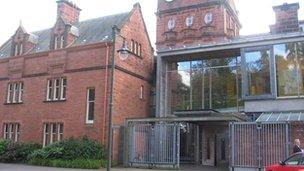The Dumfries 'super school' project that never took off
- Published

Plans for a "super school" to take S4 to S6 pupils from all four secondaries look set to be dropped
Education chiefs used to wince a bit whenever they heard the term "super school".
It was a bit too journalistic for them, I suspect, and they preferred to describe their plans as a bid to transform Dumfries into a "learning town".
Nonetheless, the words were too good for a reporter and headline writer to ignore.
Beneath the concise description lay a concept which, when it went before parents at a forum in June 2011, was thought to be an "innovative" solution to issues facing the area.
Dumfries has four secondary schools with combined rolls of about 2,500 pupils but the buildings are all in need of major investment.
They have all - bar one - seen a significant reduction in student numbers over the past 10 years.
Any suggestion of closing a site has never been deemed to be politically palatable.

It was proposed to build the new single school near the Crichton campus
So, instead, the education department drew up proposals which could have seen a new school for all S4 to S6 pupils built close to higher education facilities on the Crichton campus.
The idea was to create "wider, bigger and better opportunities" for students.
"We think that somewhere in the country at some stage people will begin to consider whether having separate primary, secondary, college and university is the best for that locality," explained education director Colin Grant at the time.
"We would like to be first to consider some of those big issues."
However, with big issues came big concerns with a string of groups having reservations about the plans - including teachers, parents, politicians and the Roman Catholic church.
Nonetheless, there was - under a Conservative-SNP council coalition - a will for the concept to at least be discussed and developed.
The logic, it seemed, was that doing nothing was not an option.
'More choice'
It was an idea which also appeared to find some favour with the Scottish government - appearing on a list of 30 new projects across the country.
That provoked claims that the plan was a fait accompli - swiftly dismissed by those taking the consultation process forward.
Gail Macgregor, who chaired the authority's education committee, said the proposed school could offer "far more choice than a traditional secondary school".

A change in the council administration has seen the "super school" bid fall out of favour
Yet still the nagging doubts remained among many people, as witnessed at a series of consultation events.
The benefits of the "super school" seemed to still be a hard sell and it was impossible to avoid the feeling that many opponents would never be convinced of the wisdom of such a change.
By the summer, just two options remained - portrayed as a "win-win" choice for the town.
Option one would see all existing secondary schools retained and refurbished.
The second revised option involved the creation of the "super school" for students in S4 and above, backed by a network of schools catering for pupils aged three to 15.
A final decision was expected before the end of the year but then regime-change intervened.
Dissent among the Conservative ranks on the council - unrelated to the education issue - saw them replaced by Labour in a ruling coalition with the SNP.
'Learning hub'
And the Labour group had been long-term sceptics over the single school proposal.
So it came as little surprise when a new option emerged this week.
A new Dumfries High School, a new Maxwelltown High School and improvements at Dumfries Academy and St Joseph's College are the goal - alongside the construction of a "learning hub" to be open to all four.
It looks - on the surface anyway - like a plan more likely to gain support from those who opposed the "super school".
There remain questions to be asked about the funding for such a scheme and if it can reverse - or at least contain - the fall in pupil numbers at the majority of the town's secondaries.
Whatever the outcome of that discussion, certainty about what the future holds would be most welcome by all parents of schoolchildren in the area.
- Published20 November 2013
- Published6 June 2013
- Published19 April 2013